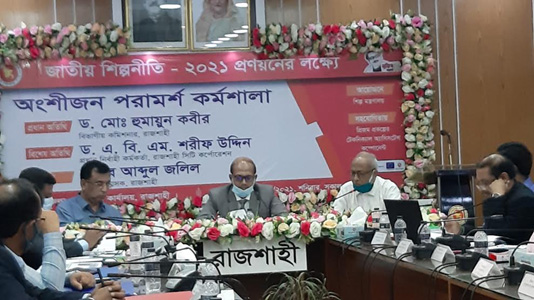RAJSHAHI, March 6, 2021 (BSS)- Speakers at a participatory discussion
unequivocally called for giving top priority on inclusion of the Rajshahi’s
potential sectors in the upcoming national industrial policy for flourishing industrial sector in the region.
Optimum industrialization in the region has become indispensable because it’s the precondition for generating employment opportunities besides socio-economic development.
There should be special incentives for the entrepreneurs who are
interested to set up industries here.
The discussants came up with the proposals while taking part in open
discussion of a stakeholders consultation workshop titled “National
Industrial Policy-2021” hosted by the Ministry of Industries at the
conference hall of Deputy Commissioner (DC) in Rajshahi today.
Commissioner of Rajshahi division Dr Humayun Kabir addressed the meeting
as chief guest, while Chief Executive Officer of Rajshahi City Corporation Dr
Sharif Uddin spoke as special guest with DC Abdul Jalil in the chair.
Senior Assistant Secretary of the industries ministry Salim Ullah gave
an illustration of the proposed policy during his multimedia presentation,
while Additional Secretary of the ministry Selim Uddin moderated the
discussion.
They told the meeting that the upcoming industrial policy will set a
target to increase the industrial sector’s economic contribution from the
existing 35 per cent to 40 percent of the country’s gross domestic product.
There is no alternative to creating skilled human resources in the
industrial sector to build an industrialised country.
The new policy is expected to focus on the IT sector in order to help
industries improve their efficiency and productivity.
Ever since the country achieved independence, a total of nine national
industrial policies have been formulated with the latest coming in 2016.
Additional Secretary Selim Uddin said the upcoming policy, which will be
valid until 2025, will give priority to the small and medium enterprises in
order to generate huge employment opportunities and ensure higher growth.
As a whole, the policy is aimed at achieving the target of gross
domestic product and generating employment through coordination between
private and public efforts.
The government also looks to reduce poverty and unemployment by taking
the advantages of the information technology-based fourth industrial
revolution, he added.
In his remarks, Dr Humayun Kabir said the highest emphasis has to be
given on skills development in the upcoming industrial policy in order to
prepare for the fourth industrial revolution.
In order to increase productivity in the industrial sector, it is
necessary to involve more people by increasing the use of modern technology
and creating skilled human resources, he added.
Dr Sharif Uddin said Bangladesh’s graduation from the status of least-
developed country by 2026 and the plan for 2021-2041 should be kept in mind
as well.
He added that there was no alternative to creating skilled manpower to
build a developed country. Improving efficiency should be given the highest
importance to reap the benefits of the fourth industrial revolution.
Environmentally-friendly industrialisation is the key to sustainable
economic development and the government is highlighting that, he opined.
Prof Amzad Hossain and Prof Abdul Wadud from Rajshahi University,
President of Rajshahi Chamber of Commerce and Industries Muhammad
Muniruzzaman, President of Bangladesh Silk Industries Owners Association
Liakat Ali and local unit president of Women Entrepreneurs Association of
Bangladesh Anjuman Ara Parveen, among other, spoke on the occasion.
Referring to enormous prospects of setting up agro-based industries in
the region, Chamber leader Muniruzzaman said need-based steps should be taken
in this regard as early as possible.
Setting up economic zones has become the demand of time. Prospect of
silk and agro-processing enterprises is bright in the region as it produces
surplus crops especially food-grains, fruits and vegetables.
He viewed the region has enormous potentials for making agro-processing
enterprises sustainable and profitable as it has been producing varieties of
fruits and vegetables every year.
The participants suggested prioritising environmentally-friendly
industrialisation, growth-dependent planning, the creation of skilled human
resources, and employment generation in the policy.



